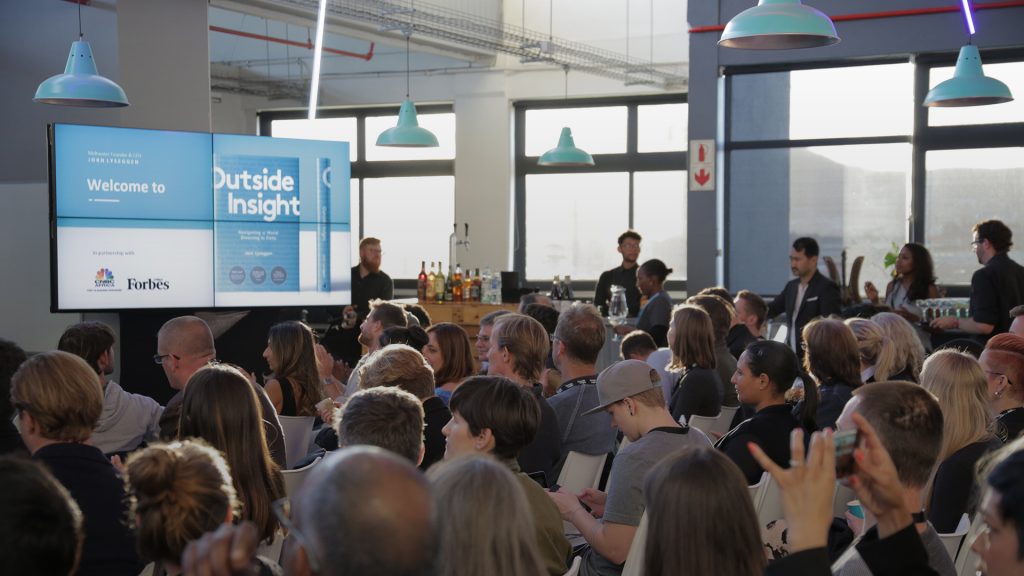Panel discussions in South Africa looked to the future, tapping insights from trend spotters and journalists, startup founders and executives across a number of fields who discussed the evolution of AI and what we need to do now to incorporate Outside Insight effectively in the future.
“Journalists may be the original data scientists. We take a [ton] of information and distill it down into the 3 most important facts, which is the intro, the headline and the 2nd paragraph.” – Toby Shapshak, Forbes Africa, CNN, The Times.
Jorn was joined by panelists including trend specialist John Sanei, Brett StClair of Siatik Systems, Dave Duarte of Treeshake and Reona Bassudeo of Thomson Reuters, as well as Lee Naik of TransUnion, Musa Kalenga of Microtising, Rory Moore of Accenture and Toby Shapshak to discuss how AI will affect corporate decision-making in the future.

AI as a continuum: the evolution of automation
“AI is not going to be a moment in time; it’s going to be a journey,” Musa Kalenga, CEO of Microtising, stated at the Johannesburg event. “It’s a continuum. On that continuum, the first step for corporate organizations is this notion about centralizing data in a way that is accessible and user-friendly, or usable.”
A resounding theme of discussions in South Africa hovered over the question “How intelligent is AI?” According to Jorn, one of the biggest surprises is that it’s not in fact intelligent at all.
“People mystify AI in ways that are not constructive. AI is not actually intelligent. AI, simply put, is a computer processing a large amount of data and finding patterns using statistics. In this way it becomes an extension of the automation of the past,” he said.
Forbes journalist Toby Shapshak agreed. Considering himself an “AI naysayer,” he stated that AI is simply the next step in machine automation that began during the industrial revolution: “With machine learning, we’re teaching computers to do things we don’t want to do ourselves. It’s a continuation of the automation we’ve seen through the 1900s of the tasks that humans used to have to do by hand that are now being done by a system.”
This does not mean, however, that AI is not incredibly useful, with an enormous amount of potential. What it does is allow us to process a massive amount of information that we would not otherwise have the ability to analyze.

Next steps: What needs to be done to implement AI in corporations at a large scale?
According to Lee Naik of TransUnion South Africa, step one particularly for large incumbents is breaking down the barriers we have up around our technology infrastructure. “I think the problem is these physical and virtual walls we put around us. I remember when the Cloud was scary for banks. Now we use all these things. You have to challenge your organization to break the walls. You can’t talk about AI if you can’t even talk about moving the server out of the basement.”
“Start by challenging how we work,” he posited. “The future is not a hard wall. It’s a porous wall where data is flowing all the time.”
Musa agreed, stating that we also need to remove the fences around our data itself in order to open ourselves up to insights from AI. “In a lot of big organizations, data has picket fences built around it and guys standing there guarding it with their lives because they don’t believe in sharing information. If an organization hasn’t taken that first step in terms of centralization and sharing of data, I think the dream of AI is just that – a dream. If you don’t have that centralized, you’re always going to have gaps and blind spots in your strategy.”
Jorn believes that even it’s the approach of the executives using these tools that needs to be altered, and that the combination of executive intuition and AI that will make a difference going forward. “I think executives in the future need to be a lot more data savvy than they are today. They need to understand how their AI model works. Humans have an important role to play even when we’re surrounded by AI. Human judgment, ethics to assess a situation is really important. AI is a tool.”
Dave Duarte of Treeshake sees the future executive as essentially a tech stack:
“The executive of the future is going to have to be far more imaginative, highly collaborative. You need to be able to interface with the machine. So you’ll have a high level of digital quotient, analytical quotient, teamwork, all of that. The executive of the future isn’t dependent on himself; he’s able to play into networks of intelligence – it’s basically a tech stack.”
“What distinguishes great executives from good executives,” Jorn continued, “is that they have the sophistication to say ‘You know what – this answer or this recommendation from AI must be wrong.’”

The role of regulation and the future of privacy
“In all our enthusiasm for AI,” Jorn warned, “I think it’s also important that we in the AI community are really thoughtful about how AI is used.” As the first generation that has been fully immersed in the online world, our privacy has been affected in ways that were never possible before, raising questions around ethics and where the line is drawn that calls for regulation.
“There are ethical issues that are arising, and they are a consequence of the sophistication and the effectiveness of artificial intelligence,” Jorn stated.
For instance, in marketing, where we can easily cross the line from influential messaging to what can be considered manipulation – if marketers are armed with sophisticated technology they begin to know more about us than we’re aware of.
“That’s why there’s a law that says you have to wear a seatbelt. There are certain things imposed on us to protect ourselves and to protect each other, and I think privacy is one of them.”

